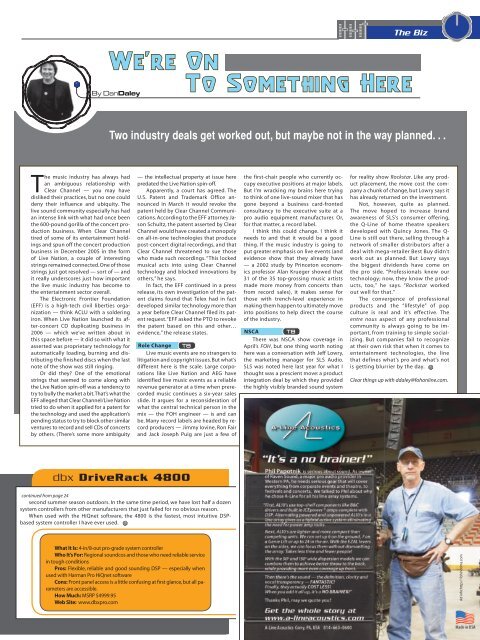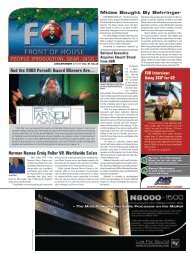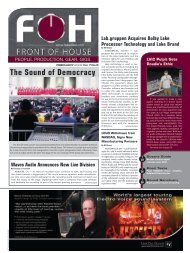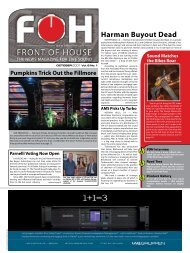May Issue - FOH Online
May Issue - FOH Online
May Issue - FOH Online
You also want an ePaper? Increase the reach of your titles
YUMPU automatically turns print PDFs into web optimized ePapers that Google loves.
The music industry has always had<br />
an ambiguous relationship with<br />
Clear Channel — you may have<br />
disliked their practices, but no one could<br />
deny their influence and ubiquity. The<br />
live sound community especially has had<br />
an intense link with what had once been<br />
the 600-pound gorilla of the concert production<br />
business. When Clear Channel<br />
tired of some of its entertainment holdings<br />
and spun off the concert production<br />
business in December 2005 in the form<br />
of Live Nation, a couple of interesting<br />
strings remained connected. One of those<br />
strings just got resolved — sort of — and<br />
it really underscores just how important<br />
the live music industry has become to<br />
the entertainment sector overall.<br />
The Electronic Frontier Foundation<br />
(EFF) is a high-tech civil liberties organization<br />
— think ACLU with a soldering<br />
iron. When Live Nation launched its after-concert<br />
CD duplicating business in<br />
2006 — which we’ve written about in<br />
this space before — it did so with what it<br />
asserted was proprietary technology for<br />
automatically loading, burning and distributing<br />
the finished discs when the last<br />
note of the show was still ringing.<br />
Or did they? One of the emotional<br />
strings that seemed to come along with<br />
the Live Nation spin-off was a tendency to<br />
try to bully the market a bit. That’s what the<br />
EFF alleged that Clear Channel/Live Nation<br />
tried to do when it applied for a patent for<br />
the technology and used the application’s<br />
pending status to try to block other similar<br />
ventures to record and sell CDs of concerts<br />
by others. (There’s some more ambiguity<br />
We’re On<br />
To Something Here<br />
By DanDaley<br />
Two industry deals get worked out, but maybe not in the way planned. . .<br />
— the intellectual property at issue here<br />
predated the Live Nation spin-off.<br />
Apparently, a court has agreed. The<br />
U.S. Patent and Trademark Office announced<br />
in March it would revoke the<br />
patent held by Clear Channel Communications.<br />
According to the EFF attorney Jason<br />
Schultz, the patent asserted by Clear<br />
Channel would have created a monopoly<br />
on all-in-one technologies that produce<br />
post-concert digital recordings, and that<br />
Clear Channel threatened to sue those<br />
who made such recordings. “This locked<br />
musical acts into using Clear Channel<br />
technology and blocked innovations by<br />
others,” he says.<br />
In fact, the EFF continued in a press<br />
release, its own investigation of the patent<br />
claims found that Telex had in fact<br />
developed similar technology more than<br />
a year before Clear Channel filed its patent<br />
request. “EFF asked the PTO to revoke<br />
the patent based on this and other…<br />
evidence,” the release states.<br />
Role Change TB<br />
Live music events are no strangers to<br />
litigation and copyright issues. But what’s<br />
different here is the scale. Large corporations<br />
like Live Nation and AEG have<br />
identified live music events as a reliable<br />
revenue generator at a time when prerecorded<br />
music continues a six-year sales<br />
slide. It argues for a reconsideration of<br />
what the central technical person in the<br />
mix — the <strong>FOH</strong> engineer — is and can<br />
be. Many record labels are headed by record<br />
producers — Jimmy Iovine, Ron Fair<br />
and Jack Joseph Puig are just a few of<br />
dbx DriveRack 4800<br />
continued from page 24<br />
second summer season outdoors. In the same time period, we have lost half a dozen<br />
system controllers from other manufacturers that just failed for no obvious reason.<br />
When used with the HiQnet software, the 4800 is the fastest, most intuitive DSPbased<br />
system controller I have ever used.<br />
What It Is: 4-in/8-out pro-grade system controller<br />
Who It’s For: Regional soundcos and those who need reliable service<br />
in tough conditions<br />
Pros: Flexible, reliable and good sounding DSP — especially when<br />
used with Harman Pro HiQnet software<br />
Cons: Front panel access is a little confusing at first glance, but all parameters<br />
are accessible.<br />
How Much: MSRP $4999.95<br />
Web Site: www.dbxpro.com<br />
the first-chair people who currently occupy<br />
executive positions at major labels.<br />
But I’m wracking my brains here trying<br />
to think of one live-sound mixer that has<br />
gone beyond a business card-fronted<br />
consultancy to the executive suite at a<br />
pro audio equipment manufacturer. Or,<br />
for that matter, a record label.<br />
I think this could change. I think it<br />
needs to and that it would be a good<br />
thing. If the music industry is going to<br />
put greater emphasis on live events (and<br />
evidence show that they already have<br />
— a 2002 study by Princeton economics<br />
professor Alan Krueger showed that<br />
31 of the 35 top-grossing music artists<br />
made more money from concerts than<br />
from record sales), it makes sense for<br />
those with trench-level experience in<br />
making them happen to ultimately move<br />
into positions to help direct the course<br />
of the industry.<br />
NSCA<br />
TB<br />
There was NSCA show coverage in<br />
April’s <strong>FOH</strong>, but one thing worth noting<br />
here was a conversation with Jeff Lowry,<br />
the marketing manager for SLS Audio.<br />
SLS was noted here last year for what I<br />
thought was a prescient move: a product<br />
integration deal by which they provided<br />
the highly visibly branded sound system<br />
The Biz<br />
for reality show Rockstar. Like any product<br />
placement, the move cost the company<br />
a chunk of change, but Lowry says it<br />
has already returned on the investment.<br />
Not, however, quite as planned.<br />
The move hoped to increase brand<br />
awareness of SLS’s consumer offering,<br />
the Q-Line of home theatre speakers<br />
developed with Quincy Jones. The Q-<br />
Line is still out there, selling through a<br />
network of smaller distributors after a<br />
deal with mega-retailer Best Buy didn’t<br />
work out as planned. But Lowry says<br />
the biggest dividends have come on<br />
the pro side. “Professionals knew our<br />
technology; now, they know the products,<br />
too,” he says. “Rockstar worked<br />
out well for that.”<br />
The convergence of professional<br />
products and the “lifestyle” of pop<br />
culture is real and it’s effective. The<br />
entre nous aspect of any professional<br />
community is always going to be important,<br />
from training to simple socializing.<br />
But companies fail to recognize<br />
at their own risk that when it comes to<br />
entertainment technologies, the line<br />
that defines what’s pro and what’s not<br />
is getting blurrier by the day.<br />
Clear things up with ddaley@fohonline.com.<br />
Ad info:http:// foh.hotims.com<br />
Ad info:http:// foh.hotims.com

















